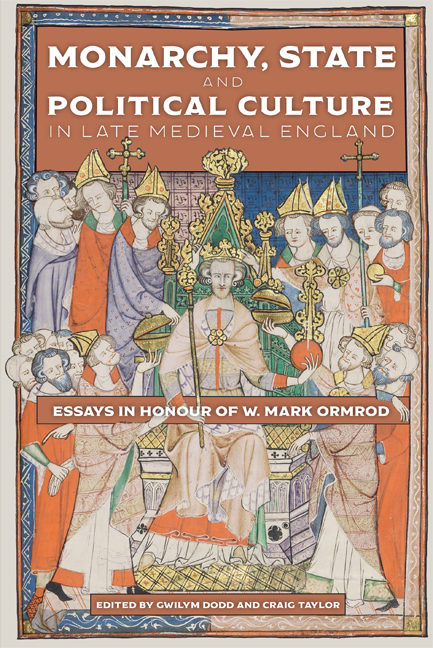Book contents
- Frontmatter
- Contents
- Frontispiece
- Preface and Acknowledgements
- Contributors
- Abbreviations
- Professor W. Mark Ormrod: A Personal Appreciation
- 1 The ‘Unfortunate’ Fraudster: Thomas de Boulton and the East Riding Lay Subsidy of 1332
- 2 Negotiating and Creating Collegiate Statutes in the Fourteenth Century
- 3 An Emotional Pragmatism: Edward III and Death
- 4 Defaming the King: Reporting Disloyal Speech in Fourteenth-Century England
- 5 Law and Arms: The Politics of Chivalry in Late Medieval England
- 6 ‘Nother by Addicions, Nother by Diminucions’: The Parliament of April 1414 and the Drafting of Late Medieval English Legislation
- 7 The Medieval ‘Side-Hustler’: Thomas Hoccleve’s Career in, and out of, the Privy Seal
- 8 The Order, Rules and Constructions of the House of the Most Excellent Princess Cecily, Duchess of York
- 9 Archbishops’ Registers Revealed: Church, State and Society in the Registers of the Archbishops of York, 1225–c.1650
- List of PhD Supervisees
- List of Grants
- Index
- Tabula Gratulatoria
8 - The Order, Rules and Constructions of the House of the Most Excellent Princess Cecily, Duchess of York
Published online by Cambridge University Press: 06 October 2020
- Frontmatter
- Contents
- Frontispiece
- Preface and Acknowledgements
- Contributors
- Abbreviations
- Professor W. Mark Ormrod: A Personal Appreciation
- 1 The ‘Unfortunate’ Fraudster: Thomas de Boulton and the East Riding Lay Subsidy of 1332
- 2 Negotiating and Creating Collegiate Statutes in the Fourteenth Century
- 3 An Emotional Pragmatism: Edward III and Death
- 4 Defaming the King: Reporting Disloyal Speech in Fourteenth-Century England
- 5 Law and Arms: The Politics of Chivalry in Late Medieval England
- 6 ‘Nother by Addicions, Nother by Diminucions’: The Parliament of April 1414 and the Drafting of Late Medieval English Legislation
- 7 The Medieval ‘Side-Hustler’: Thomas Hoccleve’s Career in, and out of, the Privy Seal
- 8 The Order, Rules and Constructions of the House of the Most Excellent Princess Cecily, Duchess of York
- 9 Archbishops’ Registers Revealed: Church, State and Society in the Registers of the Archbishops of York, 1225–c.1650
- List of PhD Supervisees
- List of Grants
- Index
- Tabula Gratulatoria
Summary
CECILY, DUCHESS OF YORK (1415–95), was one of fifteenth-century England's great landholders, and consequently the head of a substantial household. The surviving description and rules drawn up for her household open a fascinating window onto the priorities, ideals and expectations of this institution, while also illuminating the late medieval great household more generally. However, our understanding of Cecily's household ordinances is hindered by the angle of our gaze; the original purpose and audience of the text is by no means transparent. The text begins with an ‘order’ of Cecily's day that self-consciously depicts the duchess as an ideal of virtuous living and has convinced generations of historians that she spent her long widowhood in pious contemplation, avoiding the political dramas of her sons’ reigns. Like any magnate, Cecily headed a household that was a major economic and political centre in its locality, and occasionally was the site of negotiations and events of national political import. Many of those who served Cecily also served successive kings, thereby anchoring her administration close to the centre of political power. This chapter presents a new edition of her household ordinances in the context of recent scholarship on late medieval England's great households. It begins with a brief overview of this household's place in the political events of the fifteenth century. It then discusses the surviving manuscripts of Cecily's ordinances, examining the text's place within the wider genre of household ordinances, especially those drawn up for other members of the House of York. Within this framework, it explores the evidence the ordinances provide for understanding daily life at Cecily's household in Berkhamsted.
Cecily, duchess of York, was the wife of the most powerful, and one of the richest, lords in fifteenth-century England, Richard, duke of York. Following his death in 1460, and the subsequent accession of her eldest son as Edward IV in March 1461, she was probably the wealthiest widow in England. She was granted estates that were calculated to be worth just over £2,500 (in addition to £789 from customs revenues). In the year of her death, 1495, the gross receipts from her lands amounted to £2,768 6s. 5½d.
- Type
- Chapter
- Information
- Monarchy, State and Political Culture in Late Medieval EnglandEssays in Honour of W. Mark Ormrod, pp. 164 - 187Publisher: Boydell & BrewerPrint publication year: 2020



